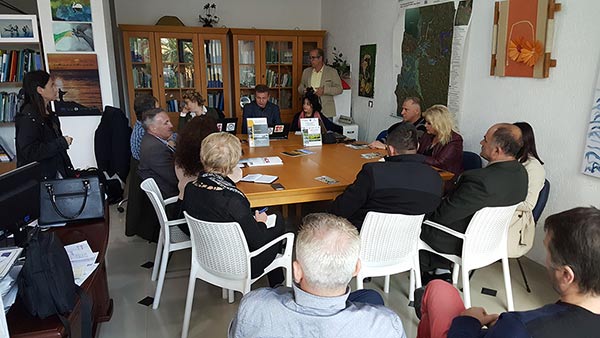
Reversing the current trend of unsustainable practices in the pilot site through effective governance and management requires a strong knowledge base, capacity and awareness on various aspects of biodiversity conservation, land use and coastal wetland management. Knowledge generated through this strategy, including gender-specific knowledge as appropriate, on the value and conservation of coastal wetlands shall be communicated and mainstreamed to influence regional and local decision making and action.
Knowledge and capacity building activities will focus on the following topics: wetland conservation and habitat management, ICZM, natural capital and ecosystem services, sustainable land use practices, water management, good governance and rights-based approaches, and transboundary cooperation.
Valuation of ecosystem services in BRVPL will be conducted using Integrated Wetland Assessment Toolkit and the Toolkit for Ecosystem Service Assessment (TESSA).
For the preparation of the socio-economic status, Livelihood analyses will be applied. It will assess the dependency of local communities on natural capital, based on habitat mapping.
The activity will result in recommendations about water use and land use planning in the area.
Identifying trends and needs in tourism sector will be performed as desk analysis and examination of gaps in knowledge, skills and capacities of tourism operators will be performed in the area.
Series of 5 annual events on coastal wetlands conservation and management will be organized that will include activities related to rising awareness of various aspects and tools related to wetland conservation and management, creating synergies with managers of similar sites in the Mediterranean.
The web platform will serve as a compendium of knowledge about BRVPL as well as on wetland and costal conservation and management.
BRVPL is included in the Shkodra Municipality area for which a new local development plan, integrating all sectors, has been approved. This medium-term planning document is key to address conservation activities within BRVPL and pressures that may arise from sector development within and around the site. BRVPL is a protected area managed by the regional branch of the National Agency for Protected Areas of Albania (NAPA).
Activities in BRVPL under this strategy could be grouped in two work packages: actions to protect fragile habitats by reducing coastal development and unsustainable land use practices and restoration of degraded habitats. Conservation measures will include improvements and/or restoration of the hydrological systems to manage freshwater regime in some of the wetlands as well as conservation measures related to unsustainable land uses. It is foreseen to establish business coalitions for sustainable tourism development and furthermore a small-grant-scheme for small size businesses for best practise and innovation in land use and sustainable tourism in order to stimulate innovative approaches. The tourism sector will be mobilised so as to support sustainable use of natural resources and land use practices and nature conservation efforts.
These grants will be launched based on the results and recommendations of activities 1.1.1, 1.1.2 and 2.2.3, in which local stakeholders will participate. The grants will have three main axes: 1) coastal habitat restoration projects; 2) agri-environmental incentive schemes including irrigation, and 3) sustainable tourism sector/infrastructure development.
The scheme will be implemented in the following steps: a) identification of grant scheme board representatives; b) preparation of ToR for grant scheme representatives; c) definition of priority themes and actions with highest added value given project objectives, time and budget constraints; d) develop ToRs and guidelines for grants, defining eligibility criteria, global objectives, themes, priority locations, target beneficiaries, expected outcomes (in terms of innovation, nature conservation, sustainable development and socio-economic benefits); e) select grantees based on predefined criteria; f) implement grant projects with mid-term review and final evaluation.
Pilot activities shall be focused on establishing and strengthening protected area management in the pilot site, with the governance component being its backbone activity. Based on mapping all relevant stakeholders and identifying management capacity gaps initial two years shall be focused on organising and kicking-off a participatory process and implementing targeted actions from the Management Plan for BRVPL and Integrated Resources Management Plan for Buna Bojana Area.
In addition to participatory process organised throughout the project, a PA stakeholder committee encompassing representatives of local stakeholders as well as those of institutions at the local and national level, will be organised in order to guide the implementation of activities that will provide technical advice and consultation platform for institutions that have the mandate to manage the protected areas or for institutions that have the mandate to perform sectorial management in the protected areas. Another major set of governance activity includes enhancing the legal and institutional framework for coastal development, aimed at analysing gaps and providing guidance on the implementation of respective legal framework, and providing technical support to the authorities responsible for coastal planning and development, including the integration of the no construction zone in spatial planning and enforcement of regulations on setbacks.
Activities to explore possibilities for and initiate transboundary cooperation in the Bojana/Buna Delta will be a third group of governance activities. The aim is to “trigger” the protection and sustainable management of the area beyond the BRVPL and to increase the potential of sustainable resource management by reducing the transboundary pressures.
This activity will establish a participatory process to identify the actors and institutions directly concerned with BRVPL and its natural resources, and distinguish them on the basis of their legal and customary rights, interests, concerns and capacities.
This action will assist PA authorities (MoE, NAPA, RAPA Shkodra), and stakeholders in developing Terms of Reference for the BRVPL Management Committee (MC) to ensure adequate implementation of the MP and coordination between the various stakeholders. With support of local partners, regular meetings of thematic focus groups will be organised in order to obtain inputs related to identification of current state, pressures, needs, opportunities and priorities of identified sector groups.
The kick-off conference in the initial phase of the project will be organized. The subsequent annual and the final conferences will be organized by BRVPL MC, back to back with the regular meetings of the MC.